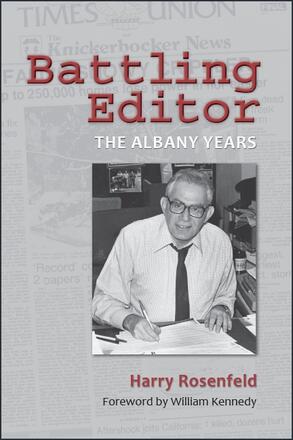
Battling Editor
The Albany Years
Alternative formats available from:
Recounts the transformation of two daily newspapers in the face of economic downturns and sweeping technological change.
Description
In 1978, Harry Rosenfeld left the Washington Post, where he oversaw the paper's standard-setting coverage of Watergate, to take charge of two daily papers under co-ownership in Albany, New York: the morning Times Union and the evening Knickerbocker News. It was a particularly challenging moment in newspaper history. While new technologies were reducing labor costs on the production side and providing ever more sophisticated tools for journalists to practice their craft, those very same technologies would soon turn a comparatively short-lived boom into a grave threat, as ever more digitally distracted readers turned to sources other than print and other legacy media for their news. Between these boundaries, Rosenfeld set about to do his work.
Picking up where his previous memoir, From Kristallnacht to Watergate, left off, Battling Editor tells the story of how Rosenfeld and his colleagues transformed two daily publications into alert and aggressive newspapers even in times of economic downturn. Bringing the investigative habits he had honed in his years at the New York Herald Tribune and the Washington Post, Rosenfeld's objective was to tell the fully rounded stories of the region's cities, suburbs, and rural towns, with awareness of both their achievements and their shortcomings. Furthermore, the misuse of power, whenever it happened, whether in city hall or the state capitol, in courtrooms or prisons, or in hospitals, corporations, community organizations, was to be exposed, and those accountable were to be held responsible.
More importantly, however, Rosenfeld's account is enlisted in the growing call to arms for all who cover the news and all who consume it. Written at a time when the credibility of news organizations is under attack by those at the highest levels of government, Battling Editor is a full-throated defense of fact-based journalism and hard-hitting reporting at the local as well as national level.
Harry Rosenfeld's award-winning book, From Kristallnacht to Watergate: Memoirs of a Newspaperman, was praised by Tom Brokaw as "a great American story … the inspiring saga of Harry Rosenfeld, arriving as a refugee and rising to the inner circle of journalists who uncovered the greatest scandal in the history of the Presidency." Rosenfeld lives in Albany, New York, where he is Editor-at-Large and a consultant at the Times Union, and also a member of the newspaper's editorial board.
Reviews
"In print and in person, Rosenfeld is frank in his accounting of past and present issues … As a longtime newshound, Rosenfeld recognizes both the need to stay current and the demands of a profession that values accuracy above all." — Albany Times Union
"Harry's book is often about tough decisions, and it stands out as a handbook on how to live an ethical life in the news business right now. Is it possible to tell the truth all the time? Sometimes. But this is an instructive narrative—especially today when the truth is such a rare commodity in the White House and Congress, and the financially beleaguered press is itself under threat as an enemy of the people. Harry and his family lived in Nazi Germany, and escaped it in 1939. A large part of his subsequent life has been an ongoing war against fascism, racism, and political criminals. This book explains how he waged that war on a daily basis in the newsrooms he managed so well, and for so long." — from the Foreword by William Kennedy
"Harry Rosenfeld made a choice. He left an exciting job at the Washington Post for the chance to do what so many editors dream of—become the guy in charge of two vibrant regional newspapers. What fun he had as a boss—being responsible for stories about local heroes, crooked politicians, and the day-to-day doings of a capital city. There also is a tinge of nostalgia in Harry's memoir, for the kind of local reporting Harry lived for has all but disappeared in today's newspaper world. Local coverage has been stripped away in newspaper after newspaper as all are facing dwindling readership and disappearing income." — Seymour M. Hersh